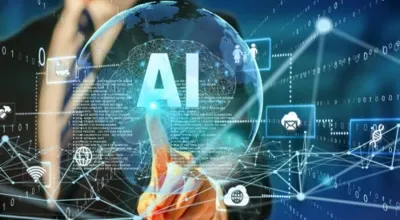Is the World Transitioning from the Information Age to the Age of Intelligence?

Synopsis
Key Takeaways
- AI is transforming information into actionable intelligence.
- Human intuition and imagination remain irreplaceable.
- Data reliability is critical for ethical AI applications.
- The relationship between AI and human intelligence is symbiotic.
- Global collaboration is necessary for responsible AI governance.
New Delhi: The triumph of the Information Technology revolution has facilitated a shift from the Industrial Age to the Age of Information. However, the emergence of Artificial Intelligence (AI) is accelerating yet another pivotal transition—from the Information Age to the Age of Intelligence. This transformation is grounded in the essential truth that while all intelligence consists of information, not all information qualifies as intelligence.
This transition is driven by the understanding that possessing information that is widely available yields no competitive advantage. It is the possession of exclusive knowledge, termed Intelligence, that provides a distinct edge.
Applications of AI are progressively becoming tools for generating and accessing such knowledge, primarily through Data Analytics. Any information deemed valuable must not only be reliable but also forward-looking, indicating both potential opportunities and risks, thus paving the way for effective action. The creation of a system of algorithms to generate insights during data analysis moves closer to bridging the divide between Artificial and Human intelligence. Fundamentally, however, AI serves as an assistant rather than a replacement for human intelligence.
It has been aptly noted that Artificial Intelligence supported by Large Language Models (LLMs) can become the ultimate vault of human knowledge. Yet, while it may determine what is factually accurate or inaccurate, it cannot assume the responsibility of discerning what is right or wrong. This role is reserved for the human mind, which is endowed with intuition grounded in ethics, spirituality, and a vision for the future.
The power of logic, a unique aspect of the human mind, arises from a blend of past experiences, the ability to observe and analyze data, and the capacity to view situations in a cause-and-effect framework. Although some elements of logic can be incorporated into machine learning, they do so in a limited manner.
Furthermore, human behavior is often shaped by personal moral values. Biases and wishful thinking can permeate any moral framework, presenting another domain where AI cannot replicate human judgment.
AI fundamentally operates on data stored in its memory, and Language Models enhance its engagement with diverse demographics and cultures, bringing it somewhat closer to mimicking human behavior. Nonetheless, it is crucial to recognize that AI is bound by the input-output principle.
Albert Einstein famously asserted that imagination surpasses knowledge in importance. His reference was not to fanciful thinking but rather to the human ability to look beyond the data at hand and envision future possibilities. In essence, he highlighted the capacity of the human mind to see the bigger picture.
Imagination and human feedback are invaluable assets in both personal and business realms, distinguishing human intelligence from machine operations. They play a crucial role in Customer Relationship Management, enabling personalized interactions, as well as in Risk Assessment, which is essential for any successful enterprise.
It is vital to differentiate between intelligence, which tests the boundaries of human cognition, and machine learning, which operates within its own limits. Intelligence, by its very nature, signifies information that forecasts what lies ahead. Consequently, the significance of Artificial Intelligence will derive from its ability to produce predictive analytics.
AI has the limitation of identifying patterns solely within the data it analyzes. If the data pertains to the traces left by an adversary or competitor, data analytics might illuminate the opponent's modus operandi and suggest possible future actions. Here, there is a partial application of logic, though not of imagination, which remains an exclusive human trait.
If AI cannot replace human intelligence, its optimal use is as an assistant to the latter, explaining the remarkable advancements of AI in professional and business arenas. A symbiotic relationship between the two ensures a promising future for humanity as a whole. Data analytics can uncover trends related to the business environment, competitive analysis, and an organization’s internal landscape. It can also pinpoint the specific needs of a business, entity, or profession to pursue a legitimate competitive edge.
AI is bolstering the knowledge economy by facilitating the development of new products and services, enhancing efficiency through cost reduction and optimal workforce utilization, and generally improving the quality of life by fostering innovation. The continual evolution of the business landscape, driven by shifting knowledge paradigms, indicates that AI applications will not be one-off occurrences and will further the cause of research and development. However, the direction of any AI operation will always rest with the human mind, imposing a fundamental constraint on AI.
As the landscape of AI expands, two key concerns are emerging: the challenge of ensuring the reliability of data banks and the potential misuse of AI for unethical or criminal purposes. In an era of fake news and misinformation proliferating on social media, only verified information should inform AI applications. Verifying the reliability of data itself presents an opportunity for AI to create significant value for businesses.
India advocates for international oversight of AI research to promote transparency and safeguard the common good. In contrast, the US views AI development primarily as an economic tool and seeks to maintain ownership rights in research and innovation.
From a strategic standpoint, AI possesses the potential to offer new instruments for security and intelligence, which could simultaneously pose a threat to global geopolitical stability. India has aptly positioned itself as a leader in calling for the ethical evolution of AI for the benefit of humanity, advocating for a collective approach to mitigate the perils of AI while advancing its applications for universal purposes.
Notably, the recent Nobel Prize winners in Physics, John J. Hopfield of Princeton University and Geoffrey E. Hinton of the University of Toronto, are trailblazers in modern machine learning research. They have both cautioned that AI could potentially lead to an apocalypse for humanity.
(The author is a former Director of the Intelligence Bureau)









